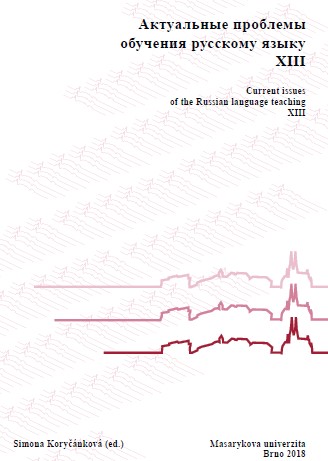РУССКИЙ ЯЗЫК КАК ВЕКТОР ПРОСВЕТИТЕЛЬСКОЙ ДОКТРИНЫ ЕКАТЕРИНЫ II (О ЛИТЕРАТУРНЫХ ОСОБЕННОСТЯХ «СКАЗКИ О ЦАРЕВИЧЕ ХЛОРЕ» И «СКАЗКИ О ЦАРЕВИЧЕ ФЕВЕЕ»)
RUSSIAN AS A VECTOR OF THE EDUCATIONAL DOCTRINE OF CATHERINE II (ABOUT LITERARY FEATURES OF "THE TALE OF THE TSAREVITCH HLOR" AND "TALE OF THE TSAREVITCH FEVEY")
Author(s): Tatiana A. Ivanovna
Subject(s): Historical Linguistics, Eastern Slavic Languages, 18th Century, Theory of Literature
Published by: Masarykova univerzita nakladatelství
Keywords: literary creativity of Catherine II; the educated absolutism; Russian;
Summary/Abstract: In article the thesis about a special role of Russian (as one of Slavic languages) in the educational doctrine of Catherine II is approved. During the entire periods of the reign the empress understood value of Russian for education of citizens. Unlike French as aristocracy language, Russian symbolized an extra class, universal message of the empress to the people. In the 1760th years it was shown in need of the translations of important modern books when Catherine translated from French on Russian "Velizary" Marmontel. At the beginning of 1770 she as the publicist protected the Russian values in the "Antidote" written in French and addressed to the western reader, and showed knowledge of the Russian customs in the comedies which are staged a bit later. After return from the material collected by him Catherine in the 1780th made of an expedition of professor P.S. Pallas and published "Comparative dictionaries of all languages and adverbs", and a specific place was held here by Slavic languages. In the same time she studied the Russian history, starting introduction of a national education system (I. Madariaga). Transferring "a dispute on ancient and new authors", significant for the French consciousness, to the course "ancient" and "new" Russia (Yu.V. Stennik), Catherine has found "golden mean" between mythological contents and available statement in a fairy tale genre. In 1781 she composes in Russian at the same time and "The Russian alphabet" and the "Tale of the tsarevitch Hlor" approving thoughts of dependence of assessment of behavior of the hero on possession by it of language skills. And if in "The Russian alphabet" language appears as the instrument of increase in personal success, then in "The tale of the tsarevitch Hlor" language – the tool of the correct education. In the following fairy tale by the empress Fevey shows already itself brilliant language proficiency not in sense of rhetorical abilities, as in the Alphabet, and in value of management of the yard − as obligatory performance by the hero of a condition for successful reign. The image in fairy tales of dialogues of heroes with the magician Felitsey-Ekaterina or the grandee Reshemyslom-Potemkin transmitted a special essence of Ekaterina's education – through educational mentoring of the Russian citizens, obligatory in the person of the state.
Book: Актуальные проблемы обучения русскому языку XIII
- Page Range: 413-419
- Page Count: 6
- Publication Year: 2018
- Language: Russian
- Content File-PDF

